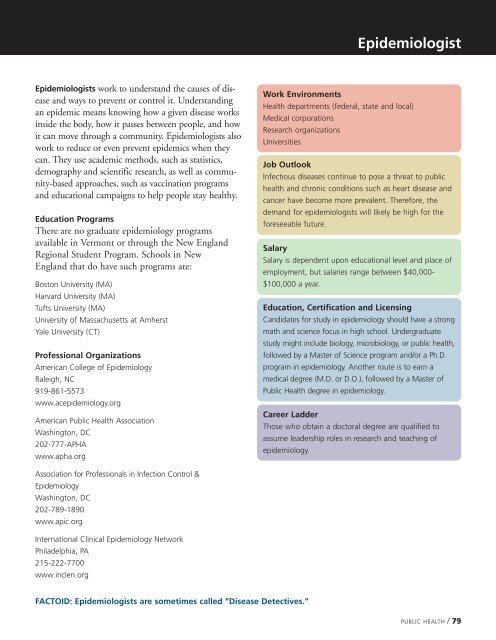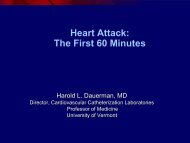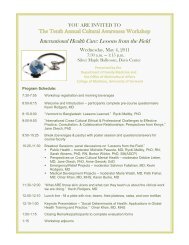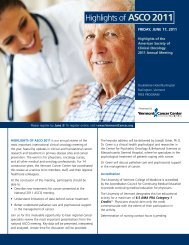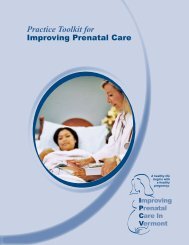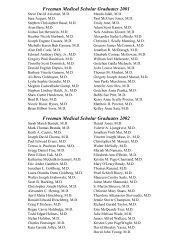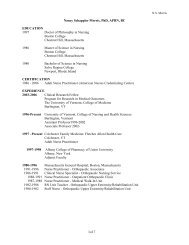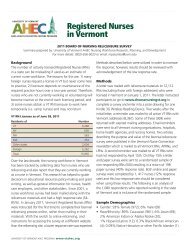Health Careers - College of Medicine - University of Vermont
Health Careers - College of Medicine - University of Vermont
Health Careers - College of Medicine - University of Vermont
You also want an ePaper? Increase the reach of your titles
YUMPU automatically turns print PDFs into web optimized ePapers that Google loves.
Epidemiologist<br />
Epidemiologists work to understand the causes <strong>of</strong> disease<br />
and ways to prevent or control it. Understanding<br />
an epidemic means knowing how a given disease works<br />
inside the body, how it passes between people, and how<br />
it can move through a community. Epidemiologists also<br />
work to reduce or even prevent epidemics when they<br />
can. They use academic methods, such as statistics,<br />
demography and scientific research, as well as community-based<br />
approaches, such as vaccination programs<br />
and educational campaigns to help people stay healthy.<br />
Education Programs<br />
There are no graduate epidemiology programs<br />
available in <strong>Vermont</strong> or through the New England<br />
Regional Student Program. Schools in New<br />
England that do have such programs are:<br />
Boston <strong>University</strong> (MA)<br />
Harvard <strong>University</strong> (MA)<br />
Tufts <strong>University</strong> (MA)<br />
<strong>University</strong> <strong>of</strong> Massachusetts at Amherst<br />
Yale <strong>University</strong> (CT)<br />
Pr<strong>of</strong>essional Organizations<br />
American <strong>College</strong> <strong>of</strong> Epidemiology<br />
Raleigh, NC<br />
919-861-5573<br />
www.acepidemiology.org<br />
American Public <strong>Health</strong> Association<br />
Washington, DC<br />
202-777-APHA<br />
www.apha.org<br />
Work Environments<br />
<strong>Health</strong> departments (federal, state and local)<br />
Medical corporations<br />
Research organizations<br />
Universities<br />
Job Outlook<br />
Infectious diseases continue to pose a threat to public<br />
health and chronic conditions such as heart disease and<br />
cancer have become more prevalent. Therefore, the<br />
demand for epidemiologists will likely be high for the<br />
foreseeable future.<br />
Salary<br />
Salary is dependent upon educational level and place <strong>of</strong><br />
employment, but salaries range between $40,000-<br />
$100,000 a year.<br />
Education, Certification and Licensing<br />
Candidates for study in epidemiology should have a strong<br />
math and science focus in high school. Undergraduate<br />
study might include biology, microbiology, or public health,<br />
followed by a Master <strong>of</strong> Science program and/or a Ph.D.<br />
program in epidemiology. Another route is to earn a<br />
medical degree (M.D. or D.O.), followed by a Master <strong>of</strong><br />
Public <strong>Health</strong> degree in epidemiology.<br />
Career Ladder<br />
Those who obtain a doctoral degree are qualified to<br />
assume leadership roles in research and teaching <strong>of</strong><br />
epidemiology.<br />
Association for Pr<strong>of</strong>essionals in Infection Control &<br />
Epidemiology<br />
Washington, DC<br />
202-789-1890<br />
www.apic.org<br />
International Clinical Epidemiology Network<br />
Philadelphia, PA<br />
215-222-7700<br />
www.inclen.org<br />
FACTOID: Epidemiologists are sometimes called “Disease Detectives.”<br />
PUBLIC HEALTH / 79


